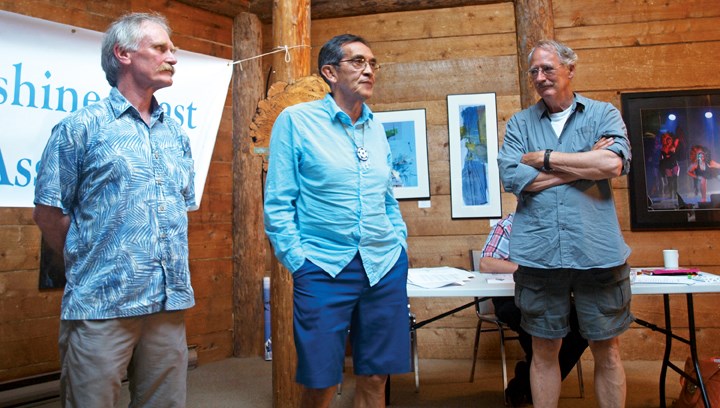The Sunshine Coast Conservation Association (SCCA) is determined to stop the Sunshine Coast Regional District’s (SCRD) Chapman Lake expansion project – and it says defeating the alternative approval process (AAP) on a loan to pay for it could be a turning point.
More than 70 people came out to the conservation association’s AGM on June 27 to hear about the group’s position on the project and discuss how to convince the SCRD to change its plan.
The SCRD wants to deepen the outlet at the lake in Tetrahedron Provincial Park to allow it to draw water from five metres deeper than it does now (three metres) in order to deal with extreme droughts.
The SCRD heard earlier this month that the earliest the project could go ahead is next summer, in part because BC Parks is not satisfied there’s been a proper environmental assessment.
A report from SCCA co-chairs Gayle Neilson and Richard Carton presented at the AGM says the SCCA “has long advocated the diversification of our regional water supply in addition to encouraging further conservation measures … Continuing to rely for most [85 per cent] of our regional water on Chapman Lake, a precious community resource in Tetrahedron Park, is not sustainable. Continuing to draw down the lake will severely impact the biodiversity of the park and the fish downstream.”
SCCA members Dan Bouman, Jason Herz and George Smith led the discussion, and at one point during the meeting Herz asked for a show of hands from people who felt they had a good understanding of what the project involved. About half indicated they did.
The trio outlined the main concerns, which include: the danger of sloughing or mudslides because of the amount of lake bottom that could be exposed by a full eight-metre drawdown, the impact of blasting to create a deeper trench, and the environmental footprint of the construction camp that would have to be set up.
They also explained what the SCCA feels the regional district ought to be doing instead of going ahead with the Chapman project. The SCCA wants the SCRD to stick with an already-approved siphon system the SCRD intends to use to pull more water from the lake if we near Stage 4 restrictions this summer, and put more effort into finding new sources of drinking water and constructing a reservoir.
Lorne Lewis, the SCRD director for Elphinstone, was the only one at the board table to vote against the project. “I’ve opposed this all along on environmental grounds,” Lewis told the crowd, noting that many of the issues being raised at the meeting were raised in a report commissioned in the late ’90s. “There’s a whole bunch of things in that report that are, in my view, concerning.”
Roberts Creek director Mark Lebbell was also at the meeting and stood to defend the project, and his support of it. He held up flip chart sheets prepared for a recent Roberts Creek Community Association meeting listing factors that went into the decision. “Between climate change and resilience, there are a lot of pieces to this water puzzle,” he said.
Sechelt (shíshálh) Nation Chief Calvin Craigan said shí-shálh shares a lot of the concerns raised by the SCCA, and wants its voice heard in the process (Sechelt Indian Band residents cannot take part in the AAP). “We have put together our technical staff to look at the recommendation the board is approaching in terms of trenching, and we’re also concerned if the lake slumps. That for me personally is a huge thing,” Craigan said. “Demand on the water [system] is a huge concern for us. The way the water is managed and used is a huge concern for us.”
When asked outright if he can stop the expansion project, Craigan suggested that a pending reconciliation agreement and a major Supreme Court of Canada decision could make that a possibility.
“The truth about that is, because of the Tsilhqot’in decision that came down in the Supreme Court, First Nations are given total authority and jurisdiction over all the land, whether they be provincial parks or whatever,” he said. “Consent has to be given by First Nations in that territory. And we’ve been, rather than imposing that, negotiating.”
The $5-million, 30-year loan (with annual debt-servicing costs of $246,857) is the SCRD’s preferred option, but if the AAP fails, the regional district plans to take out the loan over a five-year term. The short-term loan doesn’t need voter approval, but it would mean a $100.49 annual parcel tax hit instead of $22.92.
And, even though it’s not a referendum on whether to go ahead with the project, Bouman said defeating the AAP would send a clear message to the SCRD.
“I see it as kind of a disempowerment strategy to say to the public, ‘You have this alternative approval process and you can sign a counter-petition, but it doesn’t really matter because we’re going to do whatever we want to do,’” Bouman said. “I don’t buy that at all. Will they listen? Will they consider? You bet they will. You reject this through a counter petition [then] they’ve got something to talk about, and they will talk. And that’s what we want them to do.”
SCCA members also voted at the AGM to spend up to $2,000 to get their message out during the AAP, which closes July 26 at 4:30 p.m. Eligible electors in Areas A, B, D, E, F and the District of Sechelt can participate. The AAP fails if 10 per cent of those electors (1,888) submit response forms opposed to the loan. See www.scrd.ca/Alternative-Approval-Process for details.



